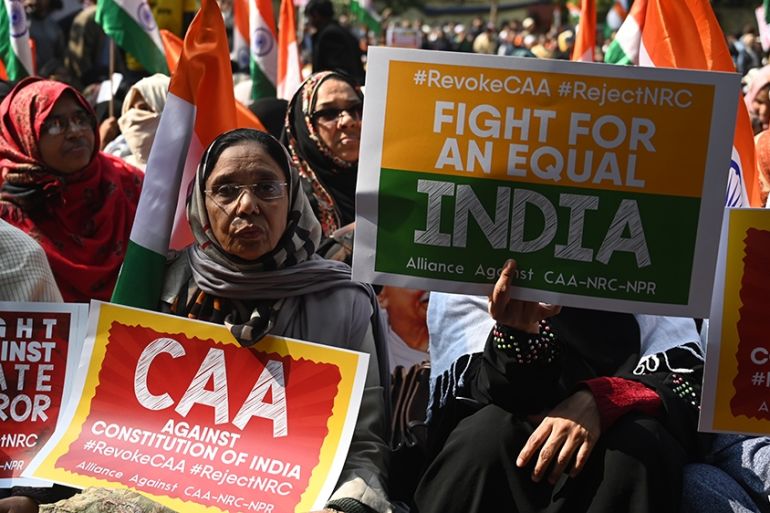National News
Controversial Citizenship Law Implemented in India Before Election
INDIA: On Monday (11 MArch 2024), India’s Home Affairs Minister Amit Shah announced that the Citizenship Amendment Act (CAA)—a highly contested piece of legislation that excludes Muslims—will soon take effect. This decision comes just weeks before Prime Minister Narendra Modi faces re-election for a third term.
Passed in 2019, the CAA aims to expedite naturalization for select religious minorities from neighboring Islamic countries such as Pakistan, Bangladesh, and Afghanistan. While proponents claim the law offers refuge to those suffering religious persecutions, critics argue that it contravenes both secular principles and the Indian Constitution, which explicitly prohibits religious discrimination.

Protesters hold placards as they demonstrate against India’s citizenship law in New Delhi [File: Sajjad Hussain/AFP]
Facing widespread criticism and protests since its passage, the central government appeared reluctant to enforce the CAA until recently. With less than six months left until the general elections, however, the Bharatiya Janata Party (BJP)-led administration decided to proceed with the implementation despite ongoing concerns regarding its impact on religious harmony within the diverse country.
Amidst mounting objections, the Ministry of Home Affairs stated, “this act is solely for individuals who endured oppression for years and possess no alternative sanctuary besides India.” As per the revised law, applicants need evidence showing arrival prior to December 31, 2014. To facilitate seamless registration, an official digital platform has been established to accept submissions.
While officials maintain that the CAA represents compassion toward vulnerable communities, opponents question the motivation behind the sudden enforcement. Opposition parties allege that the move is calculated to garner support among fervently religious voters while sowing discord amongst various ethnic groups.
All India Trinamool Congress leader Mamata Banerjee accused the government of exploiting the situation for political gain: “Implementing the law merely two to three days preceding the election declaration clearly suggests ulterior motives.” Meanwhile, Congress spokesperson Jairam Ramesh lamented the prolonged delay in finalizing regulations, attributing it to the prime minister’s deliberate deception.
Additionally, several regional frontline activists voiced apprehensions concerning the CAA’s possible consequences. For instance, Assam residents fear an overwhelming surge of foreigners crossing the border, whereas Muslim inhabitants remain anxious that the combination of the CAA and the proposed national register of citizens might pave the way for systematic religious prosecution.
Although officially excluded from the CAA’s benefits, Tamils escaping civil war in Sri Lanka may face fewer hurdles securing Indian citizenship compared to earlier requirements. Nevertheless, Rohingyas displaced by conflict in Myanmar continue to grapple with limited options under the existing policy.
Despite the apparent contradiction between secular ideals and discriminatory practices, the BJP remains steadfast in defending the CAA. By emphasizing the humanitarian aspect of the law, the party maintains that it targets neither native nor legal immigrant populations.
Regardless of intentions, the CAA carries significant implications for India’s democratic landscape. Human rights organizations such as Amnesty International decry the legislation as detrimental to equal treatment and supportive of religious segregation. Consequently, the international community watches closely as tensions escalate around the issue, threatening to destabilize peace in the region.






